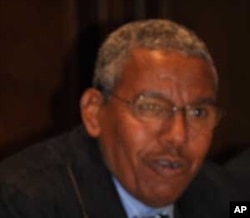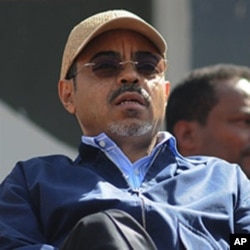In Ethiopia, officials of the ruling Ethiopian People’s Revolutionary Democratic Front (EPRDF) say they will continue to work with the opposition to strengthen the country’s fledgling democracy. The opposition says the EPRDF undermined their campaigns with intimidation and harassment.
Government spokesperson Sekou Toure rejects the allegation.
“Since the 2005 election,” he says, “we have worked together with opposition political parties. We have made progress in creating a new parliamentary procedure where the opposition parties have additional opportunities to express themselves.”
As evidence of that cooperation, he says “we have documents signed and agreed upon by both the ruling and opposition parties.” He says all parties also agreed to form a new election board.
Ethiopia’s National Electoral Board (NEBE) says the ruling EPRDF won 499 out of the 547 parliamentary seats. Prime Minister Meles Zenawi has urged the international community to respect the ruling party’s victory.
Sekou Toure says now that the election is over, the ruling party will continue to work to improve the lives of Ethiopians: “Our program is well crafted to benefit all ranks of society. We are not working only for the sector of society who is well to do, but for the masses.”
Reluctant participation
One of the groups that took part in the polls is a coalition of parties called Medrek, or Forum for Democratic Dialogue in Ethiopia. Medrek resisted calls by some opposition parties to boycott the vote.
In the lead-up to the elections, Medrek founder Seye Abraha told VOA “ no matter what, we have to stay in the game.
“Not because we have trust in the electoral system, [but] because there is no other alternative. Quitting is not the solution, taking arms is not an option.”
International reaction
Human rights groups say the government took steps to ensure it would score a clear victory. The European Union says while the vote was peaceful, the electoral process was biased in favor of the ruling party.
Washington said the ballot failed to meet international standards. A White House statement said limits on observers and harassment of independent media representatives were “deeply troubling.”
On the other hand, it commended the people of Ethiopia for their civic participation and the fact that voting was peaceful. The US Government reiterated its commitment to work with Ethiopia to further its democratization, and to improve its governance.
A long road
“The statements that have come out from the White House are absolutely consistent with that perspective,” says John Campbell a Senior Fellow for Africa Policy Studies at the Council of Foreign Relations in New York.
“I like to define democracy,” he says, “by using Abraham Lincoln’s phrase which says democracy is government of the people, by the people, and for the people.
“It’s a government that respects the worth and dignity of each individual. It is an aspiration that all of us recognizes and share.
"[It] is a journey, it’s a pilgrimage. It’s something all of us are working to achieve; we never quite get there, but we are getting closer and closer all the time.”
Campbell says each country follows its own course to democracy:
“Ethiopia’s journey,” he says, “is going to be different from that of Nigeria, the United States, France or the United Kingdom.
“I don’t think any of us could say France or the United Kingdom was inferior [to the United States] in their move toward democracy. And yet the way of getting there is quite different. I think that is true of Africa as well.”
Bad elections, he says, are better than none at all.
“Elections are enormously important even if they fail,” says Campbell.
“Through [them], people participate in an activity. [They] mark what progress has been made or not made toward democracy. “
He says the Obama administration’s continued support for the electoral process, while recognizing its problems, makes it “clear to the people of Ethiopia that the international community has some understanding of what has gone on, and recognizes that the elections that took place in Ethiopia do not meet international standards.
“In a sense,” he continues, “it is telling people who are working for democracy in Ethiopia, you are not alone.”


